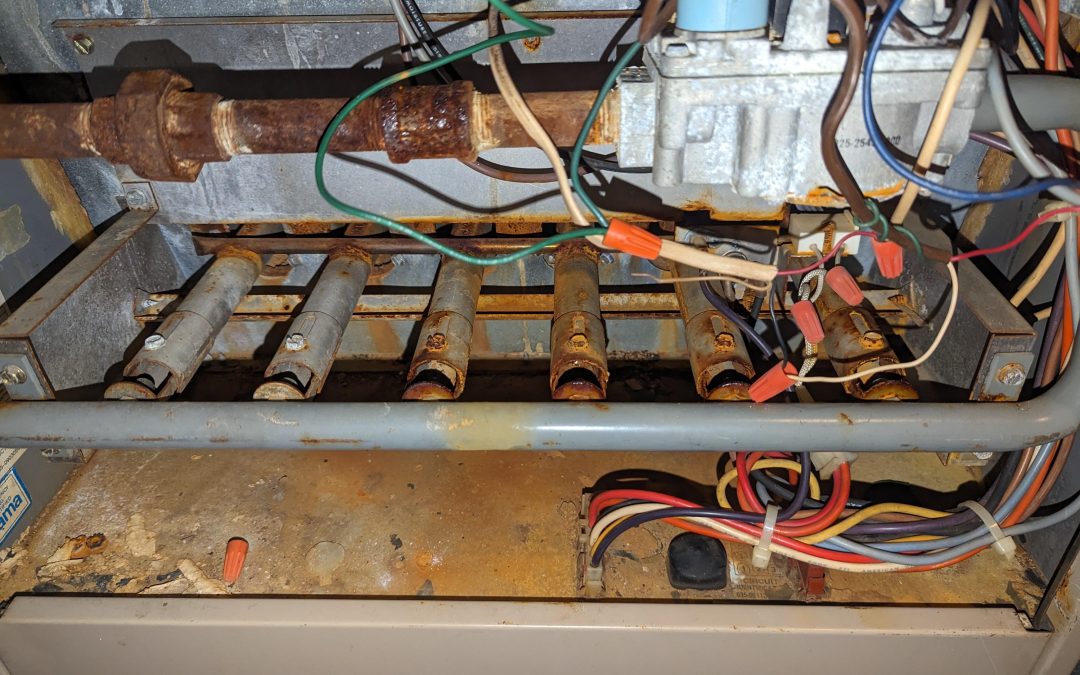Moisture Intrusion:
A lot of the time, moisture is to blame when rust starts to build. Because metals are so easily corroded, rust forms when water reacts with them. Several pathways exist in HVAC systems that allow moisture to enter. Some common entry points for moisture entering a unit are ducts that aren’t properly sealed or ventilation system leaks. Rust begins to occur when water vapour enters metal surfaces through even the smallest of holes.
Another kind of moisture that can cause rust is condensation. The formation of condensation can occur during temperature variations when the warm air comes into contact with the cold surfaces within the HVAC unit. The situation is worse in places with a lot of humidity because the corrosion problems are worse due to the atmospheric moisture.
Chemical Corrosion:
The use of chemicals in HVAC systems can hasten the rusting process, leading to chemical corrosion. Furnace by-products, for instance, are frequently acidic and can corrode metal surfaces over time. Corrosion can also occur in air conditioning systems due to poorly maintained refrigerants. Older systems are more likely to have refrigerant leaks, which can cause chemicals to be released that encourage the formation of rust.
Coils can accelerate corrosion if dirt and debris build up on them, creating a corrosive environment. Chemical corrosion can be prevented with proper maintenance. By conducting routine inspections, HVAC professionals can detect problems before they escalate. Regular filter cleaning and replacement, efficient combustion, and quick response to refrigerant leaks are essential maintenance practices.
Materials of Low Quality:
Rust avoidance in HVAC systems is greatly affected by the quality of the materials used in their construction. Certain units are more likely to rust than others due to the use of low-quality metals or insufficient protective coatings. There may be small signs of rust at first, but over time, it can weaken the structure of the equipment.
The issue is frequently apparent on external parts like screws, vents, and housing. Both the aesthetics and the operation of the equipment are diminished when these components rust.
Homeowners can reduce the danger of poor-quality materials by choosing trusted brands and doing research before buying HVAC equipment. Additional protection against rust can be achieved by applying protective coatings or treatments to susceptible sections.
The Impact on the Environment:
How quickly HVAC systems corrode is greatly affected by environmental conditions. Rust is more likely to occur on units that are exposed to extreme weather, such as those located near beaches or in places with high pollution levels. For instance, salt quickens the oxidation process, which causes corrosion to occur more quickly.
Rust can also be caused by airborne contaminants like sulfur compounds and fumes from industries. These impurities combine with moisture to form corrosive agents that damage metal surfaces. The HVAC system’s structure can be compromised by prolonged exposure to this.
Homeowners can reduce their exposure to harmful substances by keeping the outside of their HVAC unit clean and free of pollutants and salt deposits. You can also protect yourself against environmental corrosives by using protective coatings and paints that are designed to prevent corrosion.
Neglected Maintenance:
The likelihood of corrosion might be greatly increased if routine maintenance is neglected. Accumulated dust, grime, and other debris in HVAC systems can trap moisture and encourage the growth of rust. Corrosion and decreased system performance can also be caused by clogged air filters and vents.
Cleaning and lubricating moving parts, changing worn-out filters, and keeping coils clean are essential maintenance activities. Homeowners can achieve better efficiency and prolong the life of their systems by performing routine maintenance and keeping all parts clean.
To keep HVAC systems running for as long as possible, it is essential to have them inspected by professionals and to follow the manufacturer’s maintenance schedule. In addition to reducing energy usage and improving system performance, regular maintenance helps prevent rust.
FAQs:
· How Often Should I Check for Rust in My AC Unit?
You must do routine checks on your air conditioning equipment to detect and treat rust early on. It is advised to get your unit inspected at least twice a year, preferably in the off-season for heating and cooling. Look for any indications of rust throughout these examinations, paying particular attention to the coils, compressor, and other metal components. Additionally, make sure an HVAC specialist checks for rust and takes any necessary preventive action during your regular maintenance visits.
· Are Some AC Units More Rust-Resistant Than Others?
Certain AC units are constructed with materials and coatings that increase their resistance to corrosion and rust. In general, units with copper or aluminium coils corrode less easily than those with steel coils. Additionally, several manufacturers provide AC units with unique treatments or coatings to prevent corrosion.
· Is Indoor Air Quality Affected by Rust on the AC Unit?
Indeed, interior air quality can be impacted by rust on the air conditioner. Rust on the evaporator coils can make it difficult for them to adequately remove moisture from the air, which raises the humidity levels inside. Excessive humidity can foster the formation of mould and mildew, which can be harmful to indoor air quality and possibly even be health risky.
· Do AC Warranties Cover Rust Damage?
Depending on the manufacturer and the details of the warranty, different rust damage can be covered under different AC warranties. Warranties typically cover flaws in the materials and craftsmanship, but they may not cover damage brought on by outside forces like corrosion or rust. To find out what is covered, it’s crucial to thoroughly read the warranty terms.


